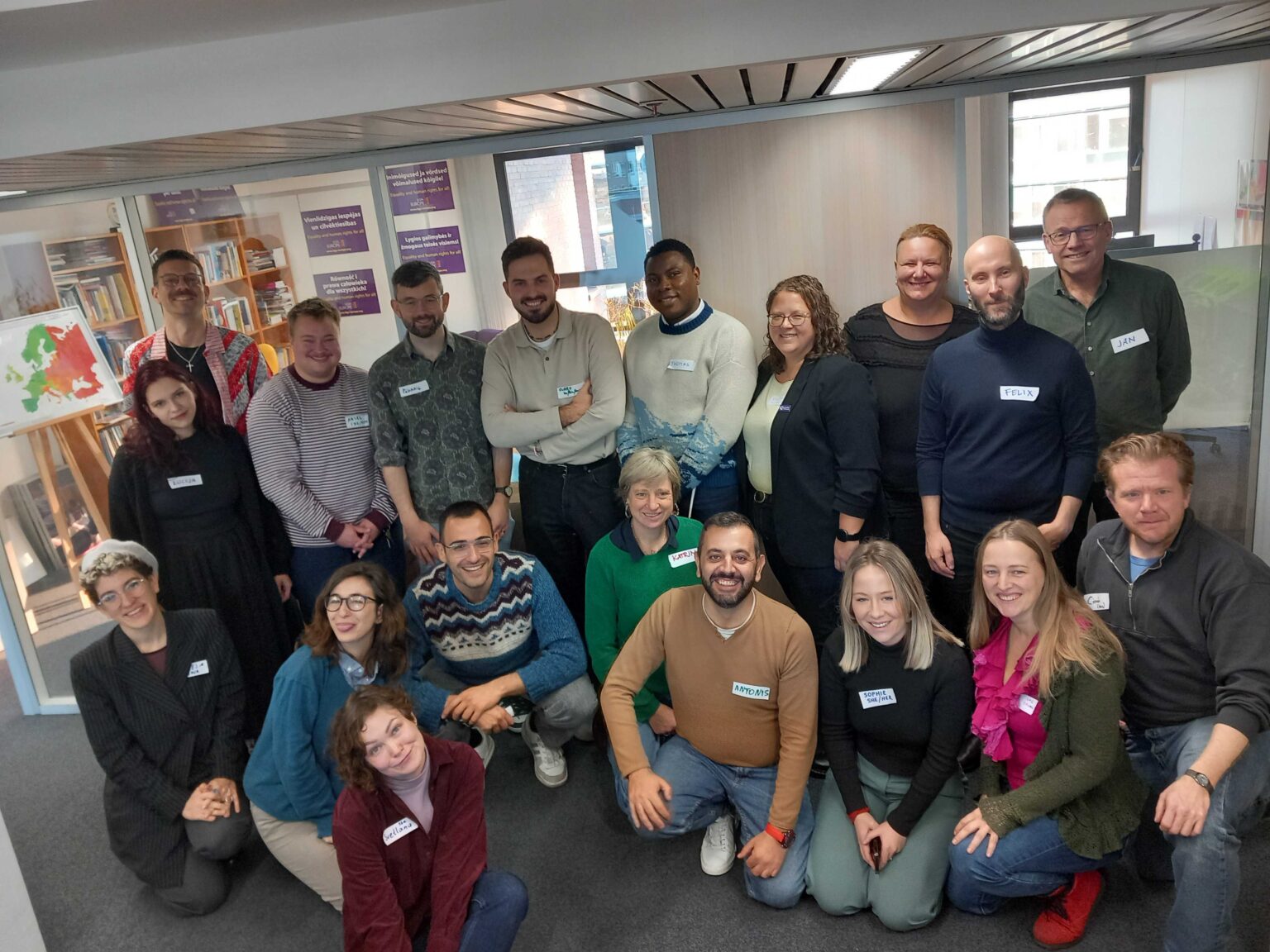How to win the fight against conversion practices in Europe

Activists across Europe are working to end conversion practices, but the insidious and underground methods out there of trying to change a person’s sexual orientation or gender identity make for a battle against many odds.
At the ILGA-Europe offices we recently hosted a meeting with activists from different parts of Europe to discuss the way forward for working to end conversion practices. For this blog, we sat down with some of them to discuss the complexities involved.
One of the key messages that emerged from the discussion was the need to expand the public’s understanding of conversion practices. While many still associate these practices with extreme forms of torture – such as electroshock therapy – the reality is more subtle. Conversion practices often take covert forms that still cause significant harm.
“Conversion practices might not always look like torture, but the effect of them is the same,” Erin Lux from Equality Scotland explained. “It is a process of trying to change or suppress who a person fundamentally is.” Curro Peña Díaz from No Es Terapia added, “What we think of as conversion practices – violent therapies – are often much more subtle and insidious. They can appear helpful, but they’re actually harmful.”
The covert nature of these practices makes them difficult to identify and combat. As Parvy Palmou from The Greek Transgender Support Association pointed out, “Most conversion practices are done behind closed doors, making them hard to prove.” Thomas Ologo from Inter-LGBT in France echoed this, noting that many conversion therapies have gone underground. He also emphasised the need for continued education, saying, “We need to ensure that people – especially professionals – understand the nuances of conversion practices so they can help prevent them.”
This shows the importance of shifting the conversation to understand that conversion practices are still widespread.
Do conversion practice bans work?
Many activists agree that while a ban on conversion practices is a necessary starting point, it is not enough. In countries where bans exist, these practices still occur underground. Aksel Emil Houmann from LGBT+ Denmark said, “A ban is not enough. We need to change the belief that queer people are broken.”
Parvy Palmou also pointed out the limitation of bans, particularly in Greece, where conversion practices are banned for minors but not for adults because adults have the capacity to provide consent. “Can someone truly consent to the torture of their own identity?” she questioned.
“By collaborating with other groups, like children’s or women’s organisations, we become stronger and more effective.”
Askel Emil Houmann, LGBT+ Denmark
For bans to be effective, they need enforcement, public awareness, and comprehensive support systems. Erin stressed: “We need to raise awareness so people understand that conversion practices are still happening and that we can stop them through both legislation and support services.”
Activists also highlight the importance of working with a broad coalition of allies. Aksel added, “By collaborating with other groups, like children’s or women’s organisations, we become stronger and more effective.”
Not simply passing laws
Alongside legal measures, activists emphasise the need to protect victims and change public attitudes. According to Curro Peña Díaz: “We need protective measures to empower victims and help them escape these harmful practices.”
Rosario Coco from Gaynet in Italy highlighted the importance of education: “We need to reach all stakeholders – mental health professionals, human rights organisations – because conversion practices involve many actors.”
Ultimately, the fight is not just about passing laws, but about shifting societal attitudes. Rosario pointed out, “A ban is crucial, but we must also move public opinion, influence institutions, and educate civil society.”
The fight to end conversion practices is complex but not impossible. Activists across Europe are leading the charge, with strategies that include raising awareness, enforcing legislation, building coalitions, and changing public perceptions. As Curro Peña Díaz summed up: “We need to ensure people know conversion therapy is still happening and that it’s extremely harmful.”
Call for participants: Meeting on national-level actions to end conversion practices

On 6 December 2024, ILGA-Europe will host a one-day in-person meeting in Brussels, Belgium, for up to 20 activists to talk about strategies and lessons learned regarding banning conversion practices.
An increasing number of countries in Europe and Central Asia have adopted or are in the process of developing bans on conversion practices. As of September 2024, ten countries have such bans in place: Belgium, Cyprus, France, Germany, Greece, Iceland, Malta, Norway, Portugal, and Spain. Efforts to develop bans are also ongoing in several other countries in the region. According to ILGA-Europe’s member organisations, there are several issues that cause regular problems in the development and debate of these bills, including sanctions and whether or how to cover conversion practices when the person subjected is an adult.
The purpose of this meeting is to gather information about the various existing and planned national-level bans, to collect good practices and responses to common issues, and to map areas where additional information is needed for advocacy in pursuit of ending these practices at the national level. The meeting is open to national level activists working on ending conversion practices, from both countries that have and have not yet adopted bans.
Logistical details
- All travel costs of selected participants, including transportation, accommodation for two nights, and subsistence, will be covered by ILGA-Europe
- The meeting is open to activists from anywhere in Europe
- Attendees will be expected to actively engage in the meeting and present about their national situation to the group (more details to be provided to selected participants)
- The meeting will take place in English
- Specific questions on transportation needs, accessibility needs, dietary requirements, etc. will be collected after selection of participants
Applications
If you’re interested in attending the meeting, fill out this application form.
Applications are due by 23:59 CEST on Monday, 6 October 2024.If you have any questions, please contact Cianán Russell, ILGA-Europe Senior Policy Officer: cianan@ilga-europe.org
The European countries fighting against ‘conversion therapies’

France and Malta are the two single countries in Europe that have fully banned so-called ‘conversion therapies’, but they are not alone in taking active steps against this harmful practice, which aims to change LGBTI people’s sexual orientation or gender identity. Keep reading to know more about ‘conversion therapy’, the countries who are taking steps against it, why it is important to put an end to the practice.
In 2021, France became the second country in Europe to fully ban so-called ‘conversion therapies’, after Malta in 2016. Recently, in May 2022, Greece banned it for minors as did Germany two years ago. In Spain, eight regions have prohibited it and in 2020 Albania adopted non-legislative medical guidelines on banning the practice. Furthermore, as seen in our Annual Review 2022, the Danish government continued with its banning plans, a citizens initiative in Finland was on its way to parliament, while in Ireland civil society set up an Anti-Conversion Therapy Coalition.
All this shows that ending ‘conversion therapies’ is an issue that’s gaining further prominence across the region – which is good news. Firstly, more LGBTI people are protected; second, these examples send a powerful message on the need of moving forward to other European governments; and third, these legislations push our societies to have a conversation about a larger stigma issue.
Why is it important to ban so-called ‘conversion therapies’?
‘Conversion therapy’ is the umbrella expression that refers to any sustained efforts to modify an LGBTI person’s sexual orientation or gender identity, so that they align with normative ways of being. It implies that not being heterosexual and/or cisgender is a mental disorder that can be fixed. Research shows that ‘conversion therapy’ does not work and that it can be harmful to LGBTI people, while fuelling societal prejudice.
Banning ‘conversion therapies’ is the first step to protect LGBTI people from this harmful practice. It can be a basis of a larger strategy, but other elements are needed. For example:
- A strong position against conversion therapies from national medical authorities
- Combatting fraudulent marketing and misinformation which asserts that these practices offer a ‘cure’, when they in fact do not, and a cure is not needed
- Awareness raising and public education about the issue
- Healthcare regulations
- Regulations within insurance systems so these practices are not reimbursed
- Dialogues between religious institutions and state authorities
- Strong statements from public officials against these harmful practices
All these elements can complete a robust strategy, while calls for bans from international bodies provide a framework for governments to work with.
We will keep working together with governments and institutions so ‘conversion therapies’ are not a threat to LGBTI people anymore.